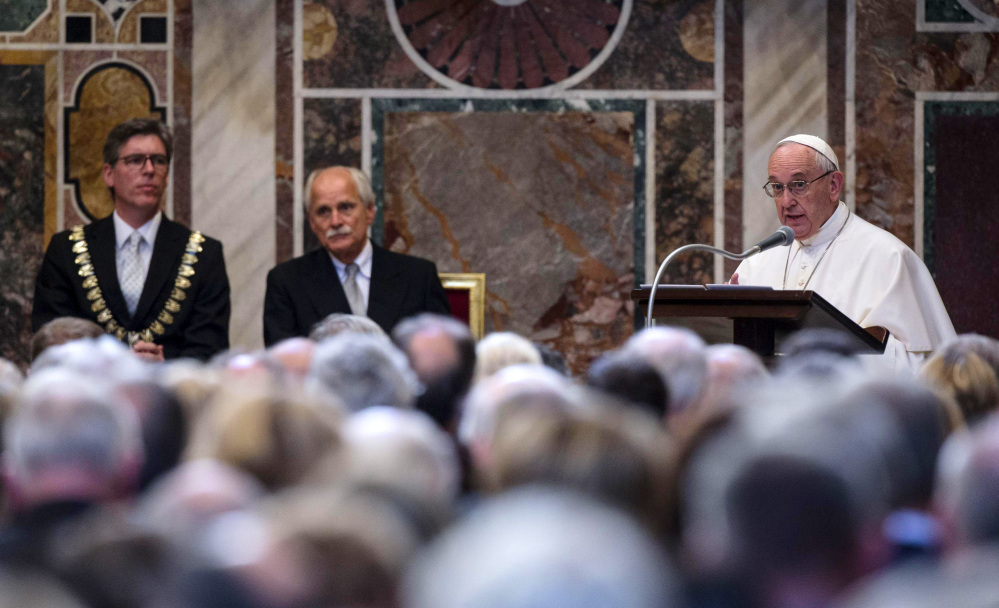VATICAN CITY — Pope Francis, accepting a prize for promoting European unity, on Friday warned Europeans against the selfish temptation to put up fences to ward off newcomers, saying he still dreams of a Europe where migrants are welcomed.
“I dream of a Europe where being a migrant is not a crime, but a summons to a greater commitment on behalf of the dignity of every human being,” he told an audience including German Chancellor Angela Merkel, Italian Premier Matteo Renzi and Spain’s King Felipe VI.
“I dream of a Europe that promotes and protects the rights of everyone, without neglecting its duties toward all. I dream of a Europe of which it will not be said that its commitment to human rights was its last utopia.”
The pontiff, the son of European immigrants to Argentina, accepted the prestigious International Charlemagne Prize, for his “message of hope and encouragement.”
Echoing the famous “I have a dream” speech by U.S. civil rights leader Martin Luther King Jr., Francis offered his vision of a Europe that cares for children, the elderly, the poor and the infirm, as well as “those newcomers seeking acceptance because they have lost everything and need shelter.”
Merkel praised Francis for sending “very clear messages.” She said his comments were a call “for us to act and keep Europe together – be it regarding the currency, or the protection of our external border, and above all not to forget the humanity and humanitarian duty of Europe.”
Notwithstanding the prize’s underlying positive message, the pope tacitly acknowledged a backdrop of a Europe engulfed in a crisis of confidence, prompted by the threat of terrorism and surge of migrants, and giving strength to nationalistic sentiments that seek to undermine the notion of a united continent.
He bemoaned that the continent’s people “are tempted to yield to our own selfish interests and to consider putting up fences.”
And he said youth unemployment was sapping the continent of its dynamism, and he called for new economic models that are “more inclusive and equitable.”
“There is an impression that Europe is declining, that it has lost its ability to be innovative and creative, that it is more concerned with preserving and dominating spaces than with generating processes of inclusions and change,” Francis said.
He urged Europeans to undergo a “memory transfusion,” citing a phrase by Holocaust survivor Elie Wiesel, to remember Europe’s fractured past when confronting issues that threaten again to divide it.
“A memory transfusion can free us from today’s temptation to build hastily on the shifting stands of immediate results, which may produce quick and easy short-term political gains, but do not enhance human fulfillment,” he said.
The pope said the Roman Catholic Church can play a role in “the rebirth of a Europe, weary, yet still rich in energies and possibilities.”
Before the ceremony in the frescoed Sala Regia, Francis met privately with Merkel, as well as with European parliament president Martin Schulz, a previous Charlemagne Prize recipient, EU Commission President Jean-Claude Juncker and EU Council President Donald Tusk, who also attended the ceremony.
Juncker, in his remarks, praised the pope for taking three Syrian refugee families to Rome with him at the end of his recent visit to Greece.
Send questions/comments to the editors.



Success. Please wait for the page to reload. If the page does not reload within 5 seconds, please refresh the page.
Enter your email and password to access comments.
Hi, to comment on stories you must . This profile is in addition to your subscription and website login.
Already have a commenting profile? .
Invalid username/password.
Please check your email to confirm and complete your registration.
Only subscribers are eligible to post comments. Please subscribe or login first for digital access. Here’s why.
Use the form below to reset your password. When you've submitted your account email, we will send an email with a reset code.